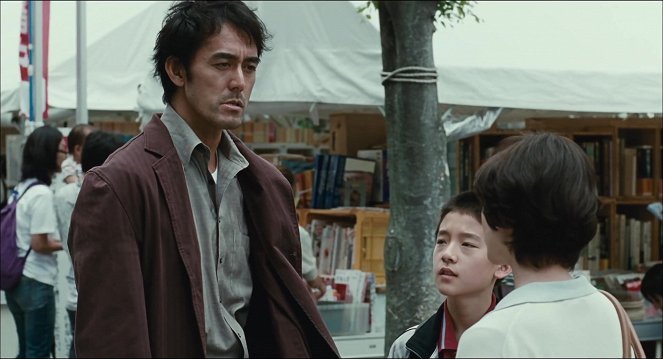Rendező:
Hirokazu Kore'edaForgatókönyvíró:
Hirokazu Kore'edaOperatőr:
山崎裕Zeneszerző:
HanaregumiSzereplők:
Hiroshi Abe, Kirin Kiki, Taiyō Yoshizawa, Yôko Maki, Sosuke Ikematsu, Lily Franky, Satomi Kobayashi, 橋爪功, Jun Matsumoto, 松岡依都美, Aizdean, Shigeki, Akoya Shinno (több)Tartalmak(1)
A korábbi sikereinek árnyékában élő író, Rjóta most magándetektívként dolgozik, és minden pénzét szerencsejátékokra veri el. Elvált feleségének se mindig képes megfizetni a gyerektartást közös fiuk után. Mikor apja meghal, újra felveszi a kapcsolatot idős anyjával, aki megözvegyülése után meglepő erővel és derűvel éli tovább életét. Rjóta újra jó viszonyt akar kialakítani anyjával és exfeleségével is, de a bizalmukat nem könnyű visszaszerezni. A férfi kétségbeesetten próbál a fia életének részévé is válni. Egy viharos éjszaka drámai történései végül esélyt adnak az újrakezdésre... (FilmNow)
(több)Recenziók (3)
It’s good to know that dysfunctional families and caring grandmothers with freezers overflowing with cheap long-ago expired food are the same in Japan as well as in the middle of nowhere. Koreeda again approached in a traditional civilian way and with a theme that eleven out of ten directors would not have been able to do without emotional blackmail or at least some cliché. But this doesn’t apply to him. It is a pity that the silence before the storm is far too long (however not boring), given that the "storm" itself is too short.
()
Dysfunctional families are everywhere, and I was pleasantly surprised by how the Japanese managed to approach the topic quite calmly, without any unnecessary extravagance, but still making the film interesting and engaging throughout its duration. Not every film can say that. As well as the fact that this isn't emotional blackmail.
()
"I've never understood why men can't live in the present. Either they're chasing after what they've long lost, or they're dreaming of things they can't reach." +++ "It's hard to find happiness if you don't forgive yourself. You have to give something up." +++ "You miss him in vain, for he no longer lives. That won't bring him back. You have to be able to get along well with people while they are still alive." +++ The wisdom of the caring mother Yoshiko, which she gained through her age and hard life, could be carved in stone. The little family drama After the Storm struck a melancholic chord of epiphany in me so true and painful that I will be contemplating its reverberations for some time to come. The words of the beautiful song at the end of the film contributed to this. +++ "What fate have I dreamt of so far? Now I bid farewell to the dreamer. I look up, the sky is just mist. Where do you think he's going and where am I going?" (85%)
()

